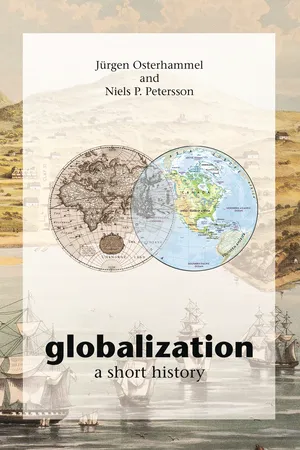![]()
Notes
CHAPTER I
1. Jan Aart Scholte, Globalization: A Critical Introduction (Basingstoke and New York: Palgrave, 2000).
2. See Hans van der Loo and Willem van Reijen, Modernisierung. Projekt und Paradox (Munich: Deutscher Taschenbuch Verlag, 1992), p. 242.
3. For references to the most important works by the authors being mentioned in the following, see the list of recommended literature.
4. Susan Strange, The Retreat of the State: The Diffusion of Power in the World Economy (Cambridge: Cambridge University Press, 1996).
5. Unrivaled in any Western language is the historical analysis of Wolfgang Reinhard, Geschichte der Staatsgewalt. Eine vergleichende Verfassungsgeschichte Europas von den Anfängen bis zur Gegenwart (Munich: C. H. Beck Verlag, 1999), pp. 509–36.
6. There is a huge body of literature on the various concepts of “culture.” As convenient introductions, see John R. Hall, Mary Jo Neitz, and Marshall Battani, Sociology on Culture (London and New York: Routledge, 2003); Adam Kuper, Culture: The Anthropologists’ Account (Cambridge, Mass.: Harvard University Press, 1999).
7. Roland Robertson, Globalization: Social Theory and Global Culture (London: Sage, 1992), p. 100; id., “Glocalization: Time-Space and Homogeneity-Heterogeneity,” in Global Modernities, Mike Featherstone, Scott Lash, and Roland Robertson, eds. (London: Sage, 1995), pp. 25–44.
8. See Robert J. C. Young, Colonial Desire: Hybridity in Theory, Culture, and Race (London: Routledge, 1995), pp. 18–28.
9. David Harvey, The Condition of Postmodernity: An Enquiry into the Origins of Cultural Change (Oxford: Blackwell, 1989), esp. p. 240.
10. Scholte, Globalization, pp. 46–50.
11. For a critical analysis of this concept, see Justin Rosenberg, The Follies of Globalisation Theory (London: Verso, 2000).
CHAPTER II
1. See Friedrich H. Tenbruck, “Gesellschaftsgeschichte oder Weltgeschichte?” Kölner Zeitschrift für Soziologie und Sozialpsychologie 41 (1989): 417–39.
2. Ulrich Beck, What Is Globalization? (Cambridge: Polity Press, 2000), p. 23f.
3. Bernhard Harms, Volkswirtschaft und Weltwirtschaft. Versuch der Begründung einer Weltwirtschaftslehre (Jena: Fischer Verlag, 1912); Michael D. Bordo, Alan M. Taylor, and Jeffrey G. Williamson, eds., Globalization in Historical Perspective (Chicago: University of Chicago Press, 2003).
4. A magisterial summary of present-day knowledge is the work by Dirk Hoerder, Cultures in Contact: World Migrations in the Second Millennium (Durham, N.C.: Duke University Press, 2002); see also Robin Cohen, ed., The Cambridge Survey of World Migration (Cambridge: Cambridge University Press, 1995).
5. See Robin Cohen, Global Diasporas: An Introduction (London: UCL Press, 1997).
6. There are numerous overviews of this topic. See Herbert S. Klein, The Atlantic Slave Trade (Cambridge: Cambridge University Press, 1999); Ira Berlin, Generations of Captivity: A History of African-American Slaves (Cambridge, Mass.: Belknap Press, 2003).
7. Barry Buzan and Richard Little, International Systems in World History: Remaking the Study of International Relations (Oxford: Oxford University Press, 2000). For a programmatic treatment, see Thomas Bender, ed., Rethinking American History in a Global Age (Berkeley, Los Angeles, and London: University of California Press, 2002).
8. Examples include Frank Ninkovich, Modernity and Power: A History of the Domino Theory (Chicago: University of Chicago Press, 1994), and Emily S. Rosenberg, Financial Missionaries to the World: The Politics and Culture of Dollar Diplomacy, 1900–1930 (Cambridge, Mass.: Harvard University Press, 1999).
9. A. G. Hopkins, “Back to the Future: From National History to Imperial History,” Past & Present 164 (1999): 198–243; Linda Colley, “What Is Imperial History Now?” in What Is History Now? David Cannadine, ed. (Basingstoke: Macmillan, 2002), pp. 132–47.
10. See Stephen Howe, Empire: A Very Short Introduction (Oxford: Oxford University Press, 2002); Susan E. Alcock, Carla M. Sinopoli, Terence N. D’Altroy, and Kathleen D. Morrison, eds., Empires: Perspectives from Archaeology and History (Cambridge: Cambridge University Press, 2001).
11. A founding text for the “new colonial history” is Frederick Cooper and Ann Laura Stoler, eds., Tensions of Empire: Colonial Cultures in a Bourgeois World (Berkeley, Los Angeles, and London: University of California Press, 1997). For a more traditional approach, see Jürgen Osterhammel, Colonialism: A Theoretical Overview, 2d ed. (Princeton, N.J.: Markus Wiener, 2005).
12. Still among the best outlines of the field is Michael Geyer and Charles Bright, “World History in a Global Age,” American Historical Review 100 (1995): 1034–60.
13. Patrick Manning, Navigating World History: Historians Create a Global Past (New York: Palgrave, 2003), p. 15.
14. See a similar treatment with a different emphasis: Bruce Mazlish, “Comparing Global History to World History,” Journal of Interdisciplinary History 28 (1998): 385–95.
15. According to David S. Landes, The Wealth and Poverty of Nations: Why Some Are So Rich and Some So Poor (New York: W. W. Norton, 1998).
16. See Jürgen Osterhammel, Geschichtswissenschaft jenseits des Nationalstaats. Studien zu Beziehungsgeschichte und Zivilisationsvergleich (Göttingen: Vandenhoeck & Ruprecht, 2001), ch. 7; Philip Pomper, Richard H. Elphick, and Richard T. Vann, eds., World History: Ideologies, Structures, and Identities (Oxford: Blackwell, 1998).
17. See the journal Review, published since 1978. To date, Immanuel Wallerstein’s major work comprises three volumes: The Modern World-System I: Capitalist Agriculture and the Origins of the European World Economy in the Sixteenth Century (New York: Academic Press, 1974); The Modern World-System II: Mercantilism and the Consolidation of the European World Economy, 1600–1750 (New York: Academic Press, 1980); The Modern World-System III: The Second Era of Great Expansion of the Capitalist World-Economy, 1730–1840s (San Diego: Academic Press, 1989).
18. On the various analytical aspects of “incorporation,” see Thomas D. Hall, “The World-System in Perspective: A Small Sample from a Large Universe,” in Globalization: Critical Concepts in Sociology, 6 vols., Roland Robertson and Kathleen E. White, eds. (London and New York: Routledge, 2003), 1: 361–64.
19. As an introduction, see Immanuel Wallerstein, The Essential Wallerstein (New York: New Press, 2000).
20. Niklas Luhmann, Die Gesellschaft der Gesellschaft (2 vols., Frankfurt a.M.: Suhrkamp, 1997), 1: 145–71. This work, which has not yet been translated into English, is the magnum opus of the leading (German) theorist of Weltgesellschaft or “world society.”
...